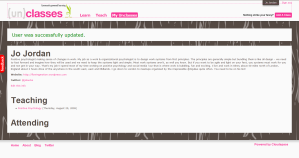Psychology and no poetry
I studied psychology and taught work psychology for many years. I arrived in psychology from the physical sciences and found the hard core experimental and measurement approach quite familiar. Indeed as a youngster, I might have fled had I been asked to deal with poetry. Literature had been my worst subject at school by quite a long way and I simply lacked the frameworks for understanding what poetry offered.
Poetry in management theory
One of the pleasures of the school of positive organizational scholarship is that it embraces poetry. Indeed, poetic language is one of the five original principles of appreciative inquiry. Leading exponent, David Cooperrider, coins many a melodic expression, the best known being: the good, the true, the better and the possible.
Poetry in government
As he accepted his nomination for Secretary of Energy, I was delighted to see Nobel Prize winning physicist Stephen Chu quoting the words spoken by William Faulkner when he won his Nobel Prize in 1950. Speaking to a world concerned about the ramifications of nuclear power and nuclear bombs, Faulkner said:
It is easy enough to say that man is immortal simply because he will endure: that when the last dingdong of doom has clanged and faded from the last worthless rock hanging tideless in the last red and dying evening, that even then there will still be one more sound: that of his puny inexhaustible voice, still talking.
I refuse to accept this. I believe that man will not merely endure: he will prevail.
He is immortal, not because he alone among creatures has an inexhaustible voice, but because he has a soul, a spirit capable of compassion and sacrifice and endurance.
The poet’s, the writer’s, duty is to write about these things.
It is his privilege to help man endure by lifting his heart, by reminding him of the courage and honor and hope and pride and compassion and pity and sacrifice which have been the glory of his past.
The poet’s voice need not merely be the record of man, it can be one of the props, the pillars to help him endure and prevail.
Poetry in business and HR?
If this is good enough for the Secretary for Energy and the White House, then it is good enough for factories, banks, shops and insurance brokers!
Do you employ a poet and an artist? Do you think a style of HR that lifts hearts, reminds us of courage and honour and hope and pride and compassion and pity and sacrifice which have been the glory of our past and are the glory of our present and our future, together?
Like this:
Like Loading...

